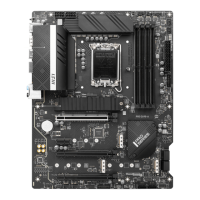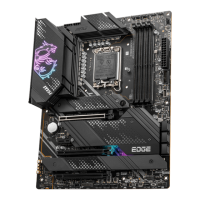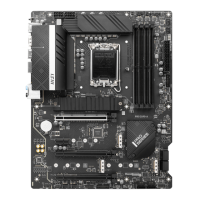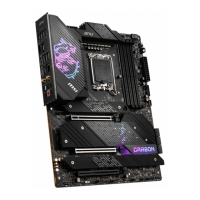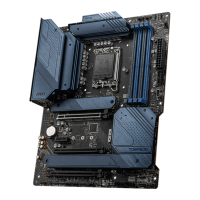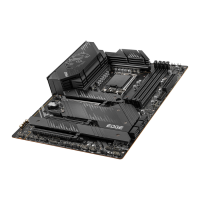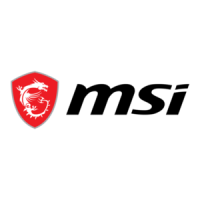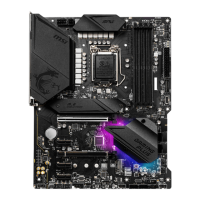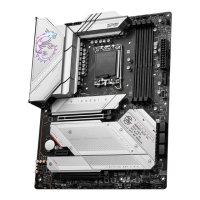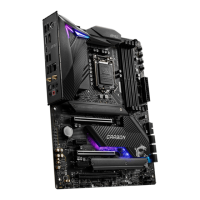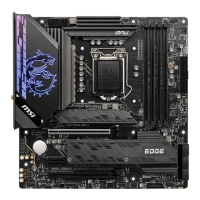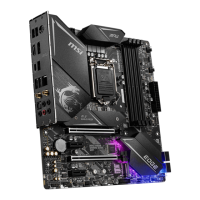Do you have a question about the MSI PRO Z690-P WIFI and is the answer not in the manual?
Essential safety guidelines for handling and operating the motherboard to prevent damage and ensure user safety.
Comprehensive technical details of the motherboard, covering CPU, chipset, memory, expansion slots, storage, and connectivity.
Details on MSI Center functionalities like LAN Manager, Mystic Light, and hardware monitoring.
Overview of audio enhancement, network capabilities, and cooling management features.
Features related to LED control, system performance, protection mechanisms, and user experience.
Diagram and identification of all ports and connectors located on the motherboard's rear panel.
Explanation of the LED indicators on the LAN port for link and activity status.
Step-by-step instructions for correctly installing and orienting the Wi-Fi antennas.
Visual guide identifying key components and connectors on the motherboard layout.
Detailed instructions for installing the CPU into the socket, including heatsink and thermal paste application.
Crucial information regarding CPU installation, heatsink mounting, thermal paste, and socket protection.
Instructions for installing memory modules into DIMM slots, with recommendations for dual-channel configuration.
Guidance on installing memory modules for optimal system stability and dual-channel mode.
Key considerations for DIMM installation, including slot order, compatibility, and overclocking.
Guidance on installing expansion cards into PCIe slots, including slot recommendations and safety tips.
Advice on installing graphics cards, using the recommended slot, and handling expansion cards.
Instructions for connecting front panel headers for power, reset, LEDs, and audio to the motherboard.
Details on connecting front panel headers for power, reset, LEDs, and audio, including polarity.
Step-by-step instructions for installing M.2 SSDs into the M.2 slots, including heatsink removal and EZ M.2 Clip usage.
Information on connecting SATA devices to the motherboard's SATA 6Gb/s interface ports.
Guidelines for connecting SATA cables, emphasizing proper bending and orientation for space saving.
Detailed pin assignment for the front panel audio header, specifying signal names for each pin.
Pin definitions for CPU power connectors and the ATX main power connector, with crucial connection advice.
Explanation of PWM and DC fan modes, pin definitions, and specifications for CPU, pump, and system fans.
Instructions for connecting the chassis intrusion connector and managing the warning messages.
Procedure for resetting the motherboard BIOS to factory default settings using the Clear CMOS jumper.
Pin definitions for USB 3.2 Gen 1 connectors and important notes on correct wiring for power and ground.
Pin definitions for USB 2.0 connectors and essential guidance on wiring for power and ground.
Pinout diagram and signal names for the TPM module connector, used for security platform integration.
Pinout details for the Thunderbolt add-on card connector, outlining signal assignments for I/O expansion.
Pinout information for connecting an optional tuning controller module to the motherboard.
Guide for connecting addressable RGB LED strips, including pinout, compatibility, and safety precautions.
Information on connecting standard RGB LED strips, including pinout, power rating, and control software.
Explanation of the EZ Debug LEDs which indicate the motherboard's status during the boot process.
Step-by-step guide for installing Windows operating systems and essential motherboard drivers.
Instructions for installing MSI Center, a utility for system optimization, monitoring, and LED control.
Benefits of UEFI BIOS, system requirements, and potential issues with older hardware or 32-bit OS.
Procedure to verify if the system is currently operating in UEFI BIOS mode.
Instructions on how to enter the BIOS setup, with a guide to the function keys for navigation and operations.
Information and link to a dedicated user guide for detailed BIOS setup instructions.
Methods for resetting BIOS settings, including using the Clear CMOS jumper or loading optimized defaults.
Step-by-step guide for updating the motherboard BIOS using the M-FLASH utility.
Instructions for updating the motherboard BIOS using the MSI Center software and its Live Update feature.
Statements regarding FCC compliance for radio frequency interference, including device conditions and user responsibilities.
Information on how the product complies with European Union directives, including RED, LVD, EMC, and RoHS.
Details on restrictions for radio functionality, including indoor use limitations and specific frequency bands and power levels.
Information on restricted indoor use for wireless radio frequency bands and its compliance with regulations.
Conditions for compliance with Innovation, Science and Economic Development Canada's licence-exempt RSS, including interference acceptance.
Notice regarding radio transmitting and receiving devices and separation distance for compliance with local standards.
Information on battery disposal in the EU and USA, including safety precautions for replacement.
Information on compliance with chemical substances regulations, such as the EU REACH Regulation.
MSI's commitment to environmental protection, product reuse, and recycling, with user guidance on proper disposal.
Statement on protecting the global environment and MSI's role in waste electrical and electronic equipment management.
Statement of product compliance with India E-waste Management and Handling Rule 2011 regarding hazardous substances.
Legal notice regarding copyright ownership, trademarks, and MSI's rights to modify documentation.
Guidance on obtaining technical support, including website resources for guides, BIOS updates, and drivers.
Records of document versions and their release dates, indicating updates and changes made.
| Chipset | Intel Z690 |
|---|---|
| Form Factor | ATX |
| Socket | LGA 1700 |
| Memory Slots | 4 x DIMM |
| Max Memory | 128GB |
| PCIe 5.0 x16 slots | 1 |
| PCIe 3.0 x16 slots | 1 |
| PCIe 3.0 x1 slots | 2 |
| M.2 Slots | 4 |
| SATA Ports | 6 |
| USB 3.2 Gen 2x2 Ports | 1 |
| USB 3.2 Gen 2 Ports | 3 |
| Bluetooth | Bluetooth 5.2 |
| Audio | Realtek ALC897 |
| USB 2.0 Ports | 6 |
| Network | 2.5G LAN |
| Wi-Fi | Wi-Fi 6 |
| RAID Support | 0, 1, 5, 10 |
